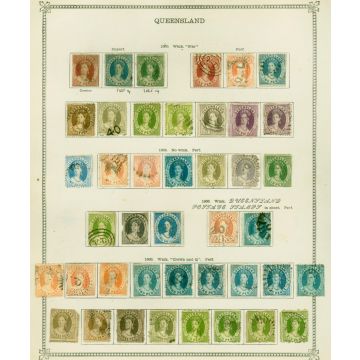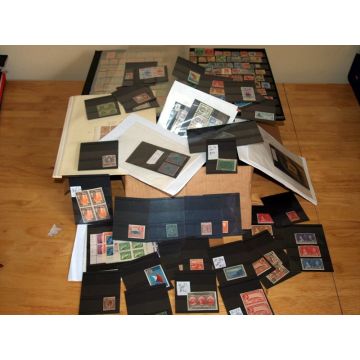Stamp Collections
It has been suggested that John Bourke, Receiver General of Stamp Dues in Ireland was the first collector. In 1774 he assembled a book of the existing embossed revenue stamps, ranging in value from 6 pounds to half a penny, as well as the hand stamped charge marks that were used with them. His collection is preserved in Dublin
Stamp collecting began at the same time that stamps were first issued, and by 1860 thousands of collectors and stamp dealers were appearing around the world as this new study and hobby spread across Europe, European colonies, the United States and other parts of the world.
The first postage stamp, the Penny Black was issued by Britain in May 1840 and pictured a young Queen Victoria. It was produced without perforations (imperforate) and consequently had to be cut from the sheet with scissors in order to be used. While unused examples of the Penny Black are quite scarce, used examples are quite common, and may be purchased for £50 to £500, depending upon condition.
People started to collect stamps almost immediately. One of the earliest and most notable was John Edward Gray. In 1862, Gray stated that he "began to collect postage stamps shortly after the system was established and before it had become a rage"
As the hobby and study of stamps began to grow, stamp albums and stamp related literature began to surface, and by the early 1880s publishers like Stanley Gibbons made a business out of this advent.
Children and teenagers were early collectors of stamps in the 1860s and 1870s. Many adults dismissed it as a childish pursuit but later many of those same collectors, as adults, began to systematically study the available postage stamps and publish books about them. Some stamps, such as the triangular issues of the Cape of Good Hope, have become legendary.
Stamp collecting is a less popular hobby, in the early 21st century than it was a hundred years ago. In 2013, the Wall Street Journal estimated the global number of stamp collectors was around 60 million. Tens of thousands of stamp dealers supply them with stamps along with stamp albums, catalogues and other publications. There are also thousands of stamp (philatelic) clubs and organizations that provide them with the history and other aspects of stamps. Today, though the number of collectors is somewhat less, stamp collecting is still one of the world's most popular indoor hobbies.



